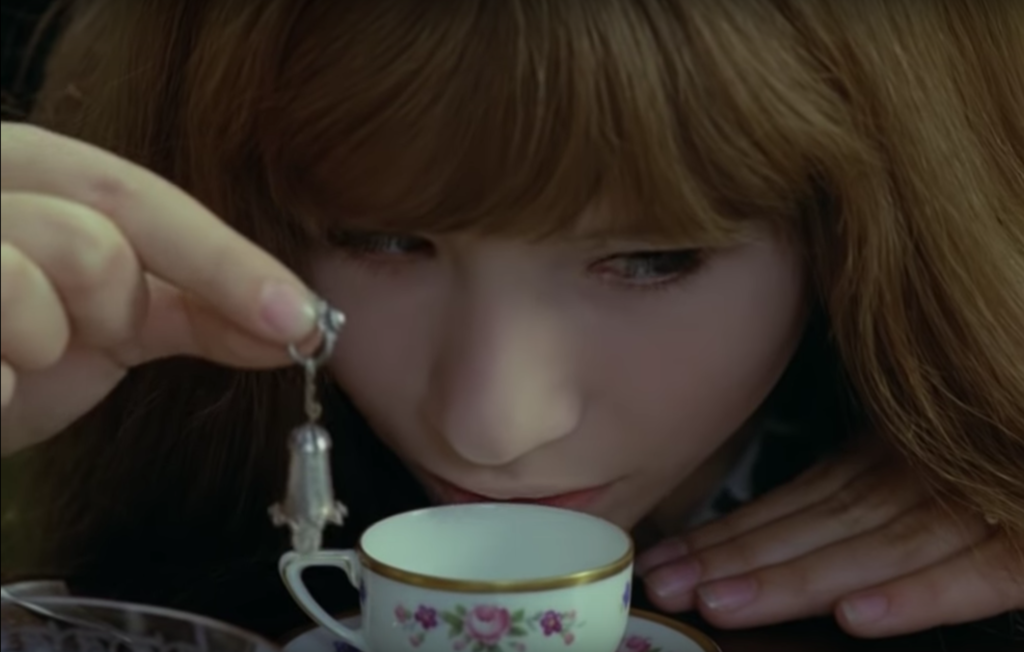
Film Matters: Please tell us about your article that is being published in Film Matters.
Alexandra Coburn: It’s about this film that was made in the 1960s in what was then Czechoslovakia and now the Czech Republic. It was essentially marketed as a vampire movie about a young woman being stalked by a group of powerful vampires. I noticed that people were talking about it in the context of being made during this specific film movement called the Czech New Wave, but they weren’t talking about it as a feminist text. My paper is essentially revisiting this random Czech film and sort of talking about it as a feminist text and the ways it influenced feminist horror on a larger scale
FM: What research and/or methodologies do you incorporate in your article?
AC: I worked very closely with Julia Kristeva’s Powers of Horror. Her work on abjection framed the way I thought about the film, especially in the film’s treatment of menstruation. Because when someone begins menstruating, whether it is in the film or in the real world, they do undergo a process similar to the abjection that Kristeva describes.
FM: Describe the original context for/when writing this article while an undergraduate student.
AC: I actually was not writing this for a class. Initially one of my professors approached me about submitting to the Society for Cinema and Media Studies (SCMS) undergraduate conference, and after presenting my paper there, he introduced me to Film Matters and suggested I pursue publication. Valerie and Her Week of Wonders was actually a film I had seen as a sixteen-year-old, but I had thought about it for many years afterward. It seemed like a natural fit to write about it. I never thought I would be interested in horror theory, but turns out, that’s what I’m primarily interested in!
FM: How has your department and/or institution supported your work in film and media?
AC: My department offers many grants for both film production and film conferences; I have received both. The grant I received was what enabled me financially to attend SCMS; otherwise, this paper probably would never have happened, because traveling to Canada to attend a conference would not have been feasible for me without financial support.
FM: How has your faculty mentor fostered your advancement as a film scholar?
AC: Matt Holtmeier is amazing. Ever since I took a class with him freshman year, I have been so interested in film studies and analysis. He makes film studies accessible without de-intellectualizing it, and he is one of the only professors I’ve had who continually puts forth work by women filmmakers, LGBT filmmakers, and filmmakers of color. He was very supportive of my desire to write a feminist analysis paper, and he essentially introduced me to feminist film theory as a freshman film student who had always been interested in the idea but had never had the language to articulate it.
FM: How has the Film Matters editorial and publication process impacted the development/evolution of your article?
AC: I think the publication process has made me aware of the fact that ultimately, I am writing for an audience. I think a lot of writers, especially in academia, can get so in their own head with their research, but if it becomes so esoteric that no one can read it, what is the point? I want my article to draw people into feminist film theory, not push them away.
FM: What audience do you hope to reach with your Film Matters article and/or what impact do you hope it has on the field of film studies?
AC: I hope my article inspires other researchers to look back at older, more obscure films and revisit them for potential subversion. I think there are a lot of films whose messages have yet to be decoded simply because, much like Valerie, their aesthetics mask the content. I also hope that this can be inspiration to other young women film students who might be interested in film analysis — your voices do matter in the field.
FM: What are your future plans?
AC: I am a recent graduate from Ithaca College now living in Brooklyn, NY. I plan to continue filmmaking and writing while I pursue a career in film exhibition and curation.
Author Biography
Alexandra Coburn recently graduated Summa Cum Laude from the Cinema and Photography program at Ithaca College with honors in English. She is focused primarily on both narrative and experimental independent filmmaking. Recently, Alex served as an intern in the Department of Film at the Museum of Modern Art and as an administrative intern with Film Forum.







































